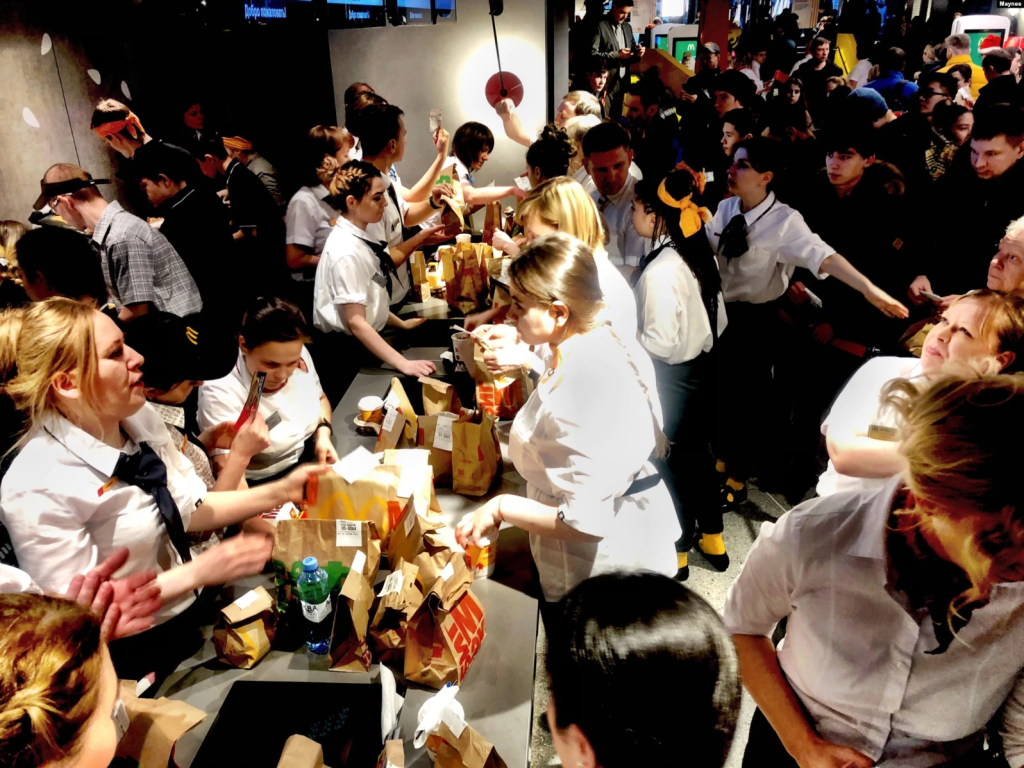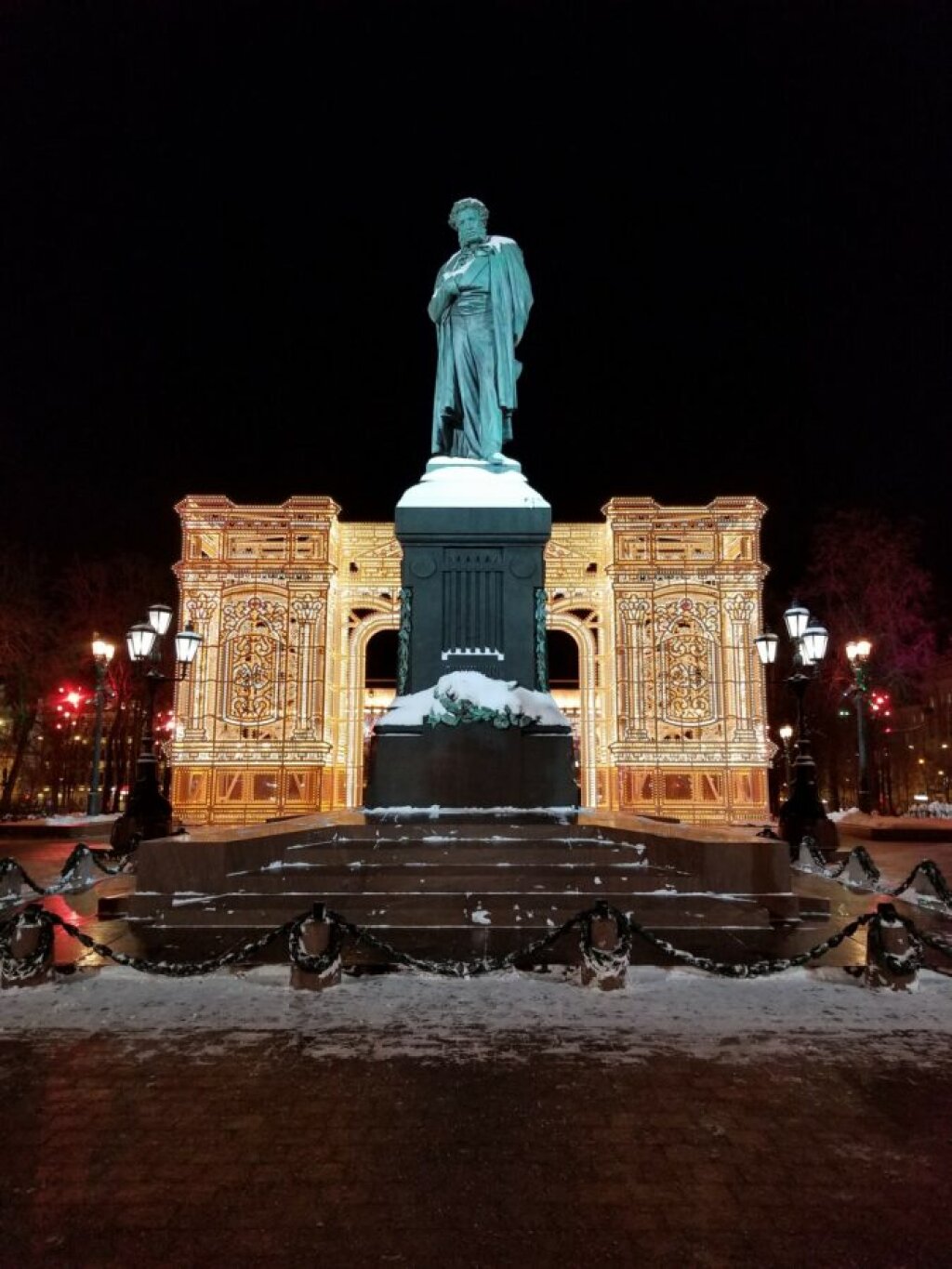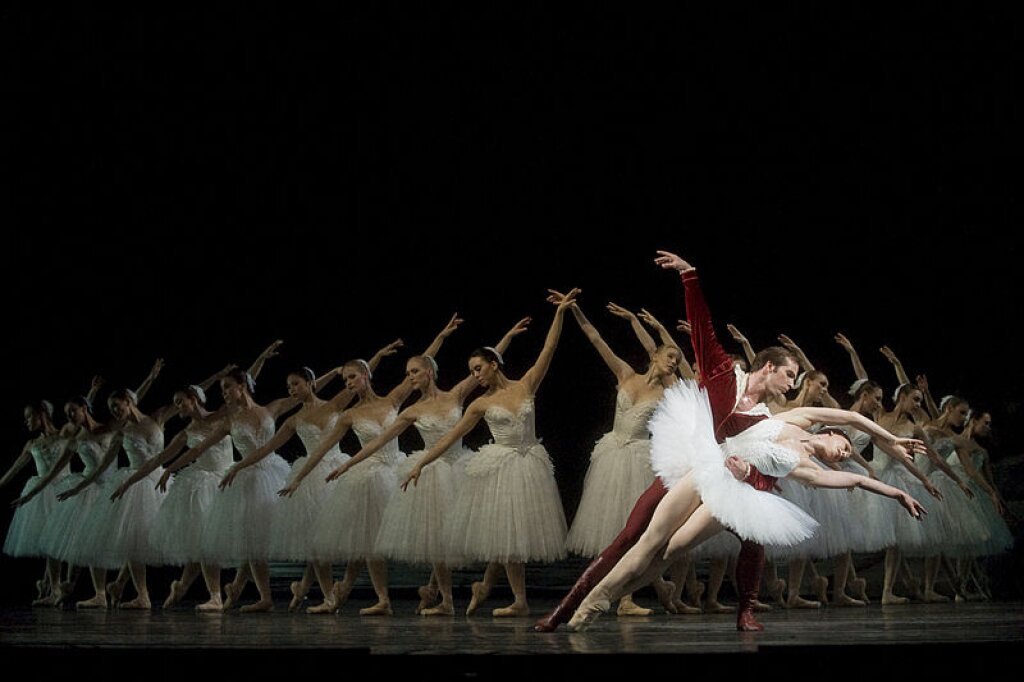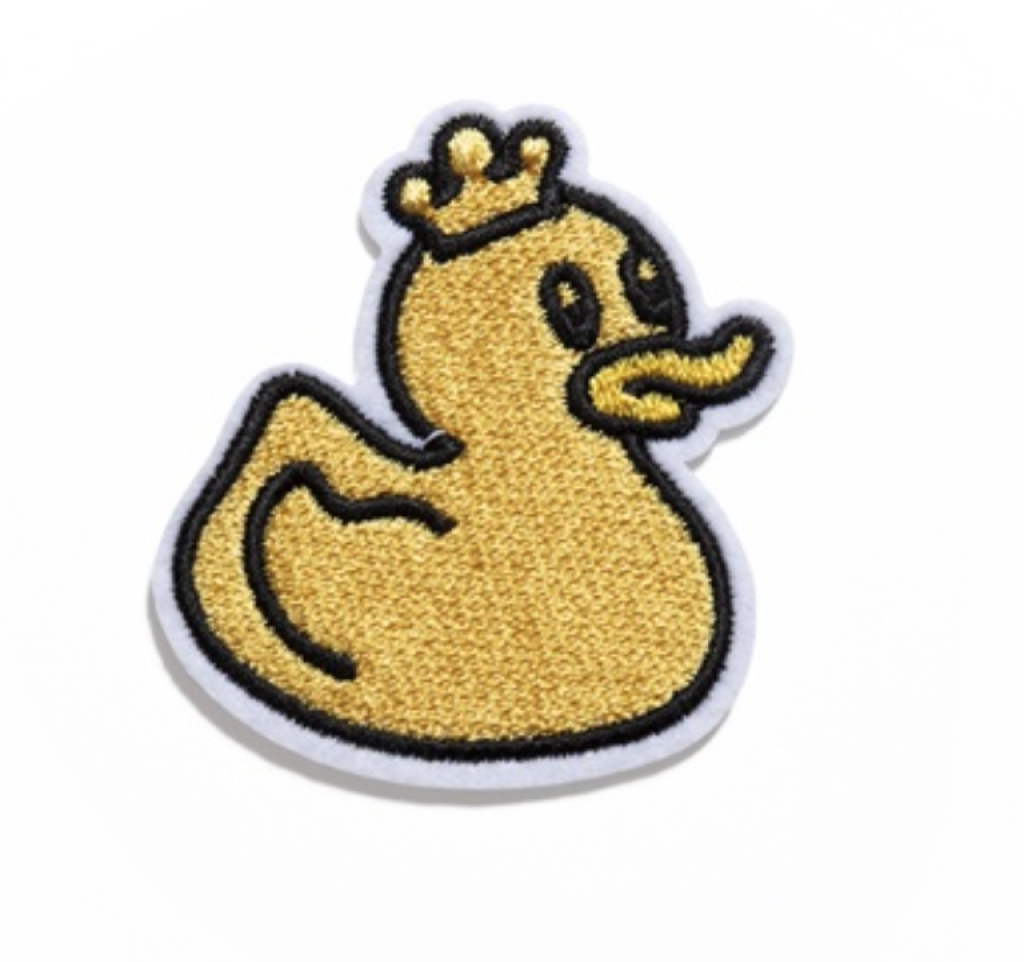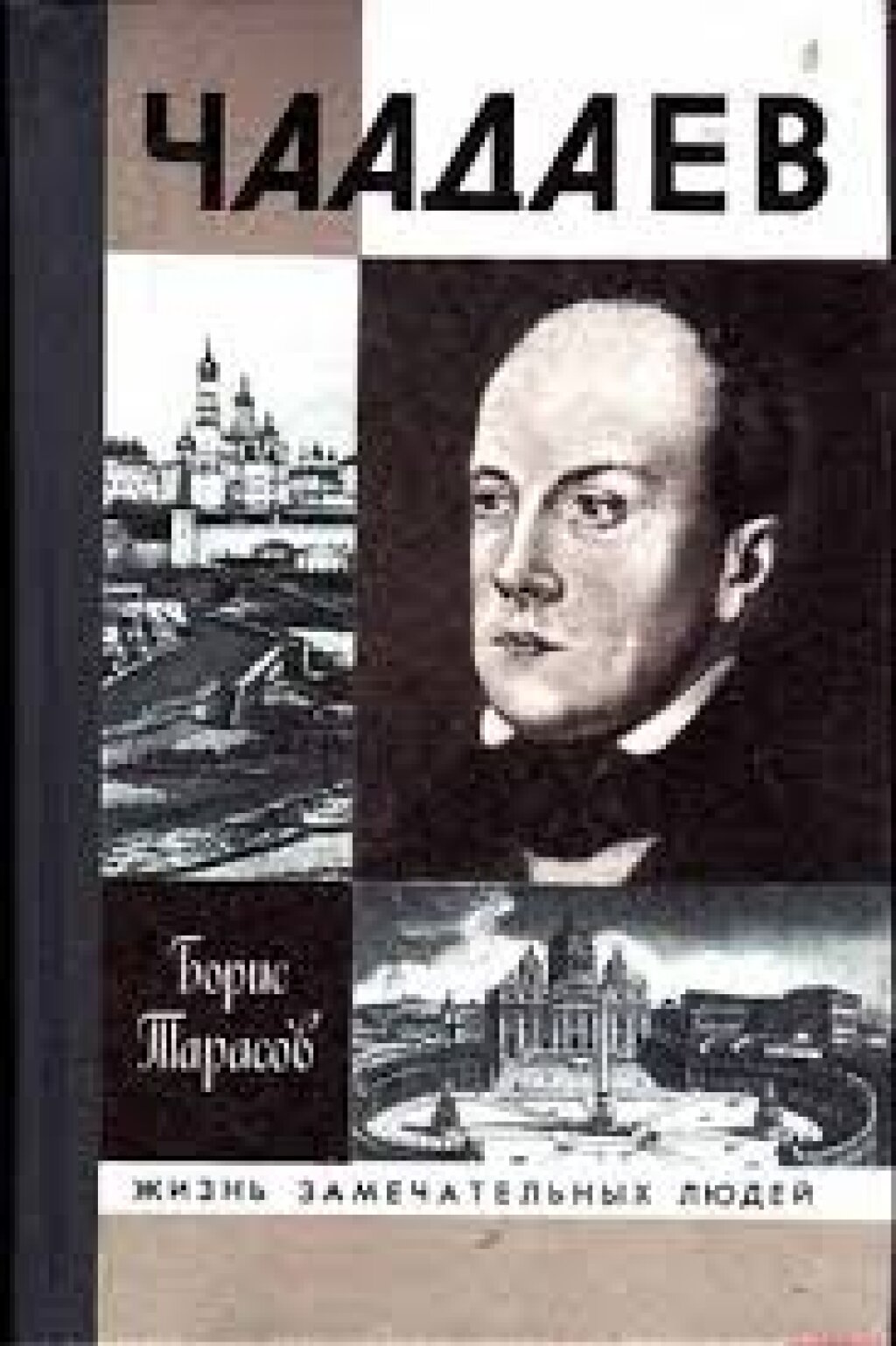We at the Jordan Center stand with all the people of Ukraine, Russia, and the rest of the world who oppose the Russian invasion of Ukraine. See our statement here.
Above: The scene inside the Pushkin Square McDonald’s in Moscow on the 30th anniversary of the restaurant’s opening in 2020.
Brianna Philpot is a graduate of NYU’s MA program in Russian & Slavic Studies and International Relations. She is Editorial Assistant for the blog.
On 8 March, McDonald's, PepsiCo, Coca-Cola, and Starbucks suspended operations in Russia. This may seem like trivial news by comparison to the mounting death toll of peaceful citizens in Ukraine and Putin's crackdowns on protestors and other dissidents at home. But McDonald’s closing its doors in Russia is more than the latest capitulation of global brands to pressure from an international community outraged by Russia's war. It marks the end of an era—a time when McDonald’s advance into the then-Soviet market seemed to portend global peace and prosperity.
McDonald’s opened its first restaurant in Russia in 1990. People waited in a massive queue that zigzagged around Pushkin square, all for a chance to spend “more than half a day’s wages” on a burger and fries. By the end of its opening day, McDonald’s: Moscow had served an estimated 38,000 people.
Television reporting from the time capitalized on the spectacle to caricature Soviet otherness.
“Soviets are used to standing in long lines for just about anything, but for Big Macs and fries, it’s a first,” an ABC correspondent explains. "Most of" the new customers, she reports, “were stunned by the cleanliness, good service, and speed.”
https://www.youtube.com/watch?v=Ygn3Mubhm8w
The broadcast's smugness is a sight to behold. Good thing McDonald’s stepped up to teach those dirty, “boorish” Russians how to act! Cleanliness, good service, and speed weren’t the only lessons McDonald's offered, either: “They had to teach Russian farmers how to raise leaner cows and grow bigger potatoes. For Russian workers, learning to be courteous was culture shock.”
The logistical challenges of opening a McDonald’s in Russia were real; establishing the supply chain took years. The company struggled even to acquire packaging and, at the beginning, imported 80% of its materials.
But the reporter’s fixation on Russian backwardness is part of a long Western tradition.
Canadian broadcaster CBC, presenting a more skeptical view of the company’s debut in Moscow, nevertheless pokes fun at the situation. In an interview with a customer, the reporter translates: “This woman doesn’t know what she just ate, but she says it was unusual and delicious.”
Further questioning reveals the more serious concern that occupies the customer's thoughts: shortages on store shelves. The choice to lead with her confusion and apparent fascination undercuts that concern, however. For the CBC reporter and her audience, this Russian woman is not a person, but an exhibit posed for Western consumption.
https://www.youtube.com/watch?v=ckbfS99N6jY
The curiosity that drove tens of thousands of Muscovites to wait in line for a Big Mac is not particular to the USSR, or a sign of cultural deprivation. Indeed, Western culture is replete with examples of avid consumers camping out for a coveted product. When the first iPhone launched in 2007, some customers waited in line for days. And if Black Friday—a scourge that appears to be a thing of the past—is any indication, the West is in no position to criticize late- and post-Soviet materialism.
Despite these similarities, the Western superiority complex remains intact.
In the CBC report, the camera juxtaposes the new McDonald’s on Pushkin Square with the poet's famous statue, while the reporter invokes Pushkin himself. “What Pushkin did write was this: happiness can only be found in communal pursuits. They started lining up this morning at four o’clock. Happiness today in Moscow lay in the communal pursuit of a Big Mac.”
True, the location was funny and perhaps even absurd, but no more so than other culturally significant spots that the franchise has descended upon. Yet these reports poke fun not at the money-hungry corporation willing to cheapen even the most beautiful or meaningful locations with its Golden Arches, but at its new customers, curious late-Soviet subjects.
Above: Pushkin Square in Moscow. Photo by author.
The teasing, which may well have been good-natured, lays bare a “West knows best” attitude. The collapse of the Soviet Union in 1991 would only reinforce Western hubris and, tragically, misunderstanding.
In his now infamous 1989 essay-turned book, Francis Fukuyama distilled the West’s misguided confidence into a single coherent ethos: the economic and cultural imperialism of the West as “the end point of mankind’s ideological evolution and the universalization of Western liberal democracy as the final form of human government.”
The spread of Western consumerism (“color television sets now omnipresent throughout China”) was a critical component in the West’s belief in its own preeminence. Thus emerged NYT columinst Thomas Friedman's so-called Golden Arches Theory of Conflict Prevention, which states that
when a country reaches a certain level of economic development, when it has a middle class big enough to support a McDonald's, it becomes a McDonald's country, and people in McDonald's countries don't like to fight wars.
In reality, a McDonald's-less Russia is hardly doomed to autocracy, no more than a Russia with McDonald's was guaranteed to become a liberal democracy. As the TV spot below demonstrates, even Pizza Hut managed to have a more nuanced view of the world.
https://www.youtube.com/watch?v=fgm14D1jHUw
The 1990 opening of McDonald's in Moscow hardly heralded the "end of history," nor did it usher in an era of peace and prosperity. But it did indicate that Soviet isolation—like the Soviet Union itself—was quickly breaking down.
Scholars have described Russia's history as cyclical. The assault on the free flow of information, like Russia's renewed isolationism, is nothing new. Since Putin's rise to power in 2000, nearly thirty journalists have been killed in Russia. Since the invasion of Ukraine, the crackdown has intensified. Meduza, an independent Russian and English language news site that operates out of Riga, was the product of an earlier wave of repressions that sent its founder—Galina Timchenko, the former editor of Lenta.ru—across the border. Meduza, along with Ekho Moskvy and Dozhd', disappeared from the Russian internet last Thursday.
Above: Swan Lake. The last image that Dozhd broadcast before going dark was a scene from Tchaikovsky’s ballet, an allusion to the Soviet-era practice of broadcasting the ballet during moments of political instability, including during the failed 1991 putsch.
Western media outlets, too, are jumping ship. The BBC, resorting to a strategy dating to the Second World War, has elected to broadcast its programming in Ukraine and Russia via shortwave radio. New restrictions on social media will make exchange between Russians and the rest of the world even more difficult.
As Western corporations divest from Russia, transactions with foreign credit cards become impossible, and airspace closes to Russian planes, a familiar, shrunken globe begins to take shape. Against this background, McDonald’s is not a harbinger, but a weathervane.
The world survived the last cold war. If we survive the next, may we learn from the lessons of the past: history is not an inexorable march toward progress; even apparent "winners" are not infallible; and we, inhabitants of every corner of the Earth, are more similar—for good and for ill—than we are different.

